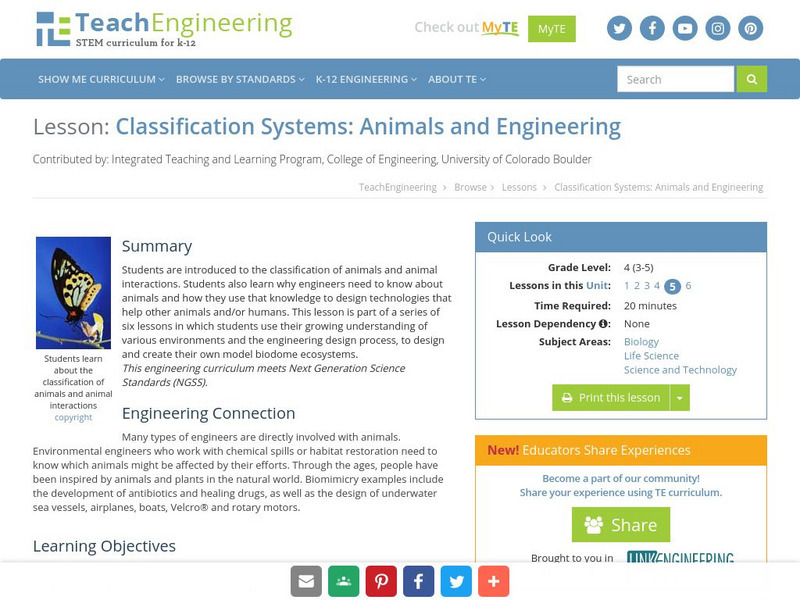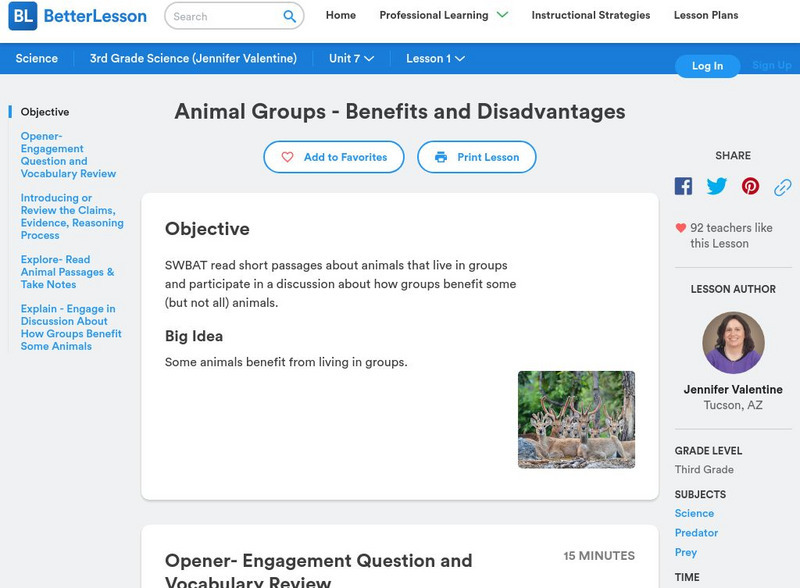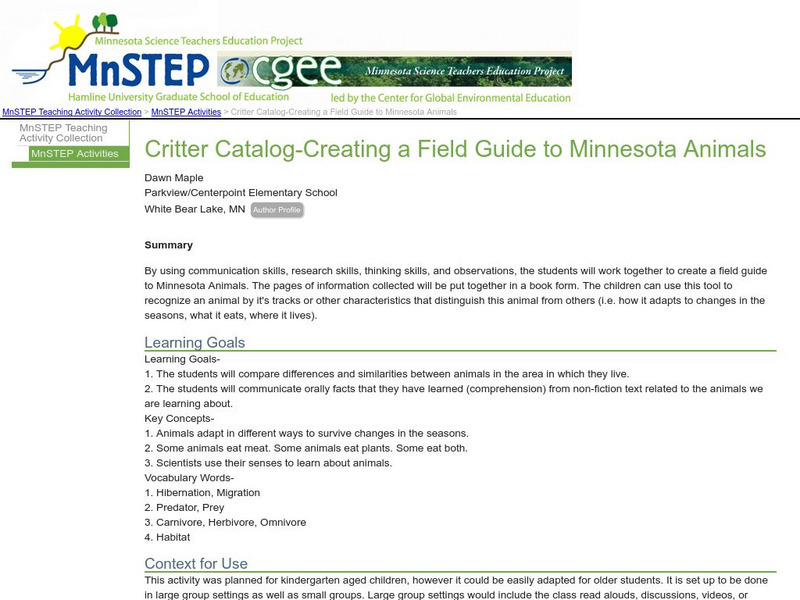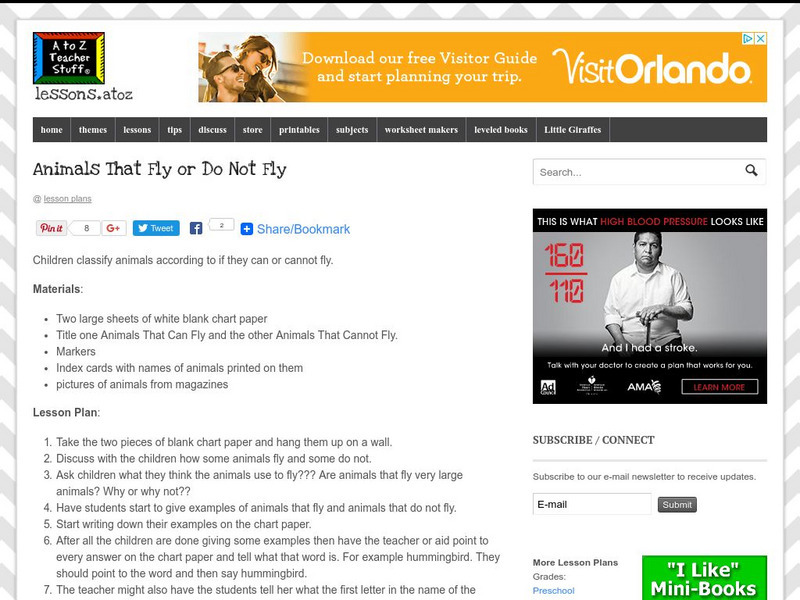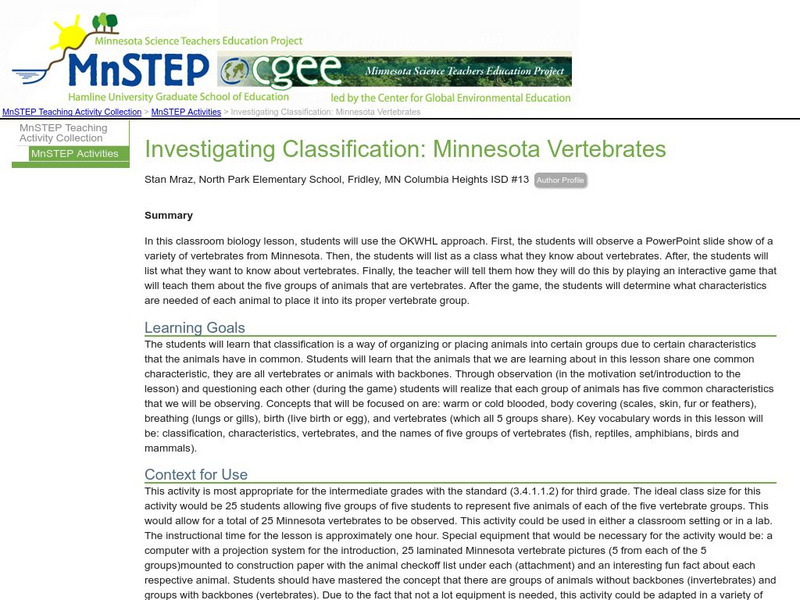Curated OER
Salinity Of Soil
Fourth graders investigate the contents of various types of soil to determine the differences in salinity levels. They conduct an experiment of observing the plants in the different soils. Students then determine survival rates by...
Curated OER
A World of Feathered Friends
students will learn to
respect the nature around them. This respect is vital because ignorance of surrounding
nature can lead to carelessness when curiosity goes awry. A perfect example of this
wayward curiosity took place at our school...
Curated OER
Sharkland Wiki
Students, while researching the waters around southern Africa and viewing a video of the episode "Sharkland" from Thirteen's series NATURE, critique reliability of online resources and analyze the various components of a wiki. They...
Curated OER
Parts of a Crinoid
Learners study the parts of a crinoid. In this parts of a crinoid lesson, students look at pictures of a crinoid fossil or examine an actual fossil if one is available. They match names to pictures of the parts in the second part of the...
ArtsNow
Arts Now Learning: Classification of Animals: "Connect Your Animal Show" [Pdf]
Fifth graders learn about animal classification by reviewing the taxonomy system, then looking at pictures of animals as if they were scientists, acting out an animal's characteristics, then classifying their animal.
Alabama Learning Exchange
Alex: Animal, Insect, and Bird Classification
As a follow-up to a unit on the classifications of animals, insects, and birds, students will attend a distance learning field trip. The students will then e-mail trusted adults some of the information learned about the classification of...
TeachEngineering
Teach Engineering: Animals and Engineering
Students are introduced to the classification of animals and animal interactions. Students also learn why engineers need to know about animals and how they use that knowledge to design technologies that help other animals and/or humans....
Alabama Learning Exchange
Alex: Animal Classification
In this lesson, learners will discuss the classification of animals. They will work in groups to research and present classification information about a selected group of animals.
Other
It's All About What's Inside. Classification and the Tree of Life [Pdf]
In this science lesson, young scholars look at how animals have traditionally been classified in a tree of life diagram by examining the characteristics of plastic eggs. They then analyze the genetic code assigned for each egg and look...
Better Lesson
Better Lesson: Animal Groups Benefits and Disadvantages
Third graders read short passages about animals that live in groups and participate in a discussion about how groups benefit some (but not all) animals.
Alabama Learning Exchange
Alex: What's Your Classification?
After completing this activity, the students will understand that scientists group animals into categories. Students will understand that scientists use specific characteristics to group animals. They will also extend their knowledge of...
Alabama Learning Exchange
Alex: Animals: Unique Creatures With Great Features
During this unit of study, students will become knowledgeable of animals' characteristics, basic needs and habitats. The purpose of this unit is to educate students through investigation and research about various animals and the...
Science Education Resource Center at Carleton College
Serc: Critter Catalog Creating a Field Guide to Minnesota Animals
Using communication skills, research skills, and thinking skills the learners collaboratively create a field guide to Minnesota Animals.
A to Z Teacher Stuff
Lesson Plan: Classifying Animals
Students classify animals according to whether or not they can fly. The lesson plan includes instructions and materials.
Science Education Resource Center at Carleton College
Serc: Investigating Classification: Minnesota Vertebrates
This lesson serves as an introduction to classification. The students will place animals into its proper vertebrate group according to certain characteristics that the animals have in common.
Discovery Education
Discovery Education: Animal Classification
Use this lesson to help students understand the reasons for classifications and ways that different species are separated.
California Institute of Technology
Infrared Zoo Lesson 1: A Trip to the Infrared Zoo
Students will use infrared images to classify different animals. Students will learn more about infrared imaging and the information it can reveal. This activity is guaranteed to activate great class discussion.
PBS
Pbs: Mathline Creature Feature Lesson Plan [Pdf]
An interdisciplinary math, science, and language arts lesson plan that engages students in an exploration of statistics. Through a study of various forest climates, students utilize data collection and analysis, classification, and...
Other
Illinois Wesleyan Univ.: Tardigrade Species Distribution Project: Lesson Plan
This lesson plan was for classes that participated in a research project on tardigrades that took place in 1999. Tardigrades, also known as water bears, are fascinating, tiny creatures that can survive under the most extreme conditions....
Biology Corner
Biology Corner: Taxonomy Project
A teacher lesson plan that allows young scholars to pretend to be an alien taxonomist working with fictitious animals to create their scientific name, classification chart, design a dichotomous key, and create a food web.
Utah Education Network
Uen: Why Do You Classify This?
Group pictures of animals into similar groups to practice classification.
Utah Education Network
Uen: Classifying Kids
Classification activity relating to plants and animals.
Utah Education Network
Uen: Keys and Classifying
Sort and classify an assortment of objects relating to classifying Utah plants and animals.
ArtsNow
Arts Now Learning: Magic Rocks [Pdf]
In this lesson, young scholars work in groups with each acting as a predator, prey, or family member in a particular habitat. They present their habitat performance to the class and students identify the habitat and animal relationships....




![Arts Now Learning: Classification of Animals: "Connect Your Animal Show" [Pdf] Lesson Plan Arts Now Learning: Classification of Animals: "Connect Your Animal Show" [Pdf] Lesson Plan](https://d15y2dacu3jp90.cloudfront.net/images/attachment_defaults/resource/large/FPO-knovation.png)

